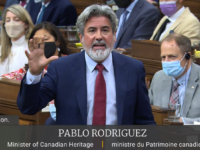Canadian Heritage Minister Pablo Rodriguez is on the defensive as he tries to defend Bill C-18 in the wake of both Google and Facebook signalling that they may remove Canadian news from search results and social media sharing in light of the government’s approach that creates mandated payments for links. Rodriguez appeared on CBC yesterday and had no answers for the questions about what he will do if the companies walk away from news given government estimates that they could be on the hook for 35% of the news expenditures of every news outlet in Canada if they continue to link to their news content. More notably, he contradicted both his own bill and his own department officials when he told Postmedia that “C-18 has nothing to do with how Facebook makes news available to Canadians.” For those who followed months of gaslighting with Bill C-11, this comment will provide a sense of deja-vu since Rodriguez sometimes leaves the impression has only read media lines, rather than his own legislation.
Search Results for "c-11" : 409
The Law Bytes Podcast, Episode 159: Fenwick McKelvey on the Rapid Spread of Government TikTok Bans
TikTok may be enormously popular, but according to the growing number of government, there are concerns regarding links between the app and the Chinese government. That has led to a rapid spread bans of the TikTok app on government devices not only at the federal level, but at provincial and municipal governments and even at universities for university-owned devices. But is TikTok unique in this regard? How to reconcile the government’s insistence that TikTok contribute to Cancon in Bill C-11 with it banning the app due to security risks? Are the privacy concerns more about TikTok or the government’s inaction on privacy reform?
Fenwick McKelvey is an Associate Professor in Information and Communication Technology Policy in the Department of Communication Studies at Concordia University and the co-director of the Applied AI Institute. He returns to the Law Bytes podcast to talk about the TikTok bans, the state of Canadian policy in addressing the concerns, and why we may be heading for more geo-political battles over digital policy.
Episode 159: Fenwick McKelvey on the Rapid Spread of Government TikTok Bans
TikTok may be enormously popular, but according to the growing number of government, there are concerns regarding links between the app and the Chinese government. That has led to a rapid spread bans of the TikTok app on government devices not only at the federal level, but at provincial and […]
Hey Minister Rodriguez: Canadian Digital Creators Are Not Loopholes
The battle over Bill C-11 is nearing its conclusion as the government introduced a motion in the House of Commons yesterday that rejects the Senate’s amendment that would ensure that platforms such as Youtube would be caught by the legislation consistent with the government’s stated objective, but that user content would not. As I discussed yesterday, the decision leaves no doubt about the government’s true intent with Bill C-11: retain the power and flexibility to regulate user content. In fact, I noted that Canadian Heritage Minister Pablo Rodriguez wasn’t trying to disguise that objective since the justification for rejecting the change boiled down to the government wanting the power to direct the CRTC on user content today and the power to exert further regulation tomorrow.
The TikTok Block: Why Does the Canadian Government Seem to Embrace Weak Privacy Rules?
The Canadian government often talks about the importance of privacy, but actions speaks louder than words. Not only has privacy reform clearly not been a priority, but the government seems more than willing to use the weak privacy rules to further other policy goals. There is an obvious price for the government’s indifference to privacy safeguards and it is paid by millions of Canadians when major privacy incidents (think Tim Horton’s or Home Depot) result in no substantive changes and no urgency for reform from the government. Indeed, as I noted yesterday on Twitter, the government has managed to rush through user content regulation in Bill C-11 and mandated payments for links in Bill C-18, but somehow privacy reform in Bill C-27 has barely moved. Some of the responsibility must surely lie with Innovation, Science and Industry Minister François-Philippe Champagne, who brings high energy to everything but privacy reform, but the decision reflects on the entire government.










